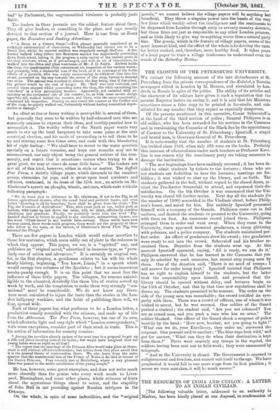THE CLOSING OF THE PETERSBURG UNIVERSITY. WE extract the following
account of the late disturbances at St. Petersburg from the private correspondence of the Kolokol, a Russian newspaper edited in London by M. Herzen, and circulated by him. dreds in Russia in spite of the pollee. The ability of its articles and the character of its editors have given it such a reputation that the present Emperor insists on seeing it, and it is said that his Ministers sometimes cause a false .copy to be printed in fac-simile, and sub- stituted for any number that they regard as especially dangerous. Of the persons mentioned in this narrative, Count Schuvaloff is at the head of the third section of police ; General Philipson is an old soldier, who has been rewarded for his services in the Caucasus and in recolonizing the Cossacks of the Black Sea by the appointment of Curator to the University of St. Petersburg ; Ignatieff, a stupid and brutal man, is Governor-General of St. Petersburg.
It is note-worthy that the number of students at St. Petersburg has trebled since 1856, when only 463 were on the books. Probably this increase of educated men under such teachers as Professor Kave- line is one reason why the reactionary party are taking measures to damage the institution.
" The new beginnings have been suddenly reversed ; it has been de- cided to admit students by tickets to the lectures ; those who are not students are forbidden to hear the lectures; meetings are for- bidden ; it was wished to shut up the library, and so forth. The students gathered in the hall, without regard to the closed doors, in- vited the Pro-Rector Sreznefski to attend, and expressed their dis- satisfaction. On the Gth October it was announced that the Uni- versity was closed till further notice. Next day all the students (to the number of 1500) assembled in the Vladimir street, before Philip- son's house, and asked for him. But suddenly Ignatieff presented himself with a company of the Guards. Philipson came out in fall uniform, and desired the students to proceed to the University, going with them on foot. An enormous crowd joined them. Philipson arranged them in order and went away. When they came to the University, there appeared mounted gendarmes, a troop glittering with poleaxes, and a police company. The students maintained per- fect order. An officer of gendarmes drew his sword ; two gendarmes were ready to cut into the crowd. Schuvaloff and his brother re- strained them. Deputies from the students went up. At this moment Ignatieff appeared, saying, All is ready, we can do it.' Philipson answered that he has learned in the Caucasus that you only do mischief by such measures, but cannot stop young men by them. One of the deputies said, 'There is no need of troops; I will answer for order being kept.' Ignatieff insisted that Philipson has no right to explain himself to the students, but the latter took the responsibility upon himself, and promised that the library should be opened without delay, and lectures begin on the 14th of October, and that by that time new regulations shall be drawn up. The students promised to be content. The order on the side of the young men was remarkable; the crowd testified its sym- pathy with them. There was a crowd of officers, one of whom it was wished to arrest, but he was rescued. One soldier of the Guard pushed a student; the student said, 'Are you not ashamed? You are an armed man, and you push a man who has no arms.' The soldier blushed. One officer of the Guard shook a sergeant of police heartily by the hand How now, brother, are you going to fight ?' 'What can we do, your Excellency, they order us,' answered the sergeant. One peasant said to another : The blue caps look wild,' and got for answer, What can they do when their destination is kept from them ?' There were scarcely any troops in the capital, the soldiers having been sent out to field-work; they were summoned by telegraph.
And so the University is closed. The Government is opposed to enlightenment and freedom, and cannot suit itself to the age. We have prophesied it would fall in one more stage from its first position ; it seems we were mistaken, it will be much sooner."






























 Previous page
Previous page